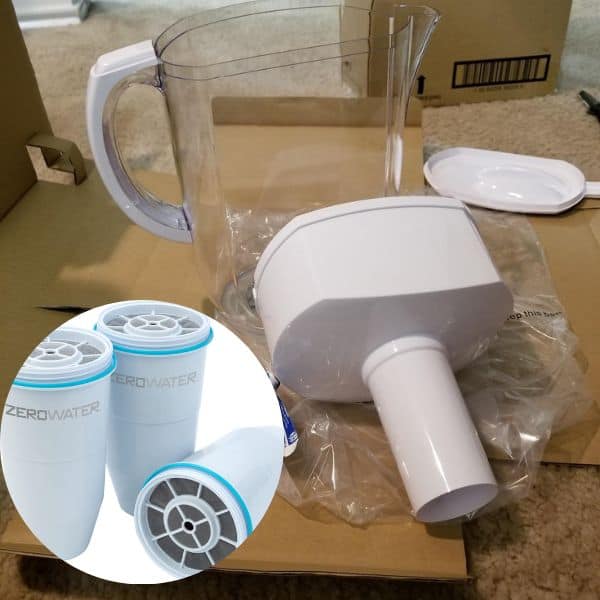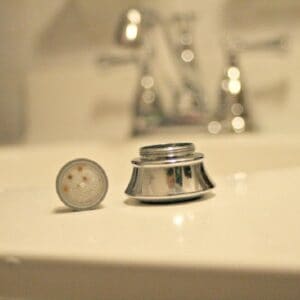Brita Pitcher vs. Zero Water
For those looking to reduce their environmental impact and improve their health, there are many water filter options available. Two popular water filter pitchers are the Brita Pitcher and ZeroWater but how do they differ from each other?
Brita Water Filter Pitcher
The Brita Pitcher is an affordable water filter pitcher that uses a combination of ion exchange and activated carbon filter to remove chlorine and other contaminants from tap water. Different types of Brita filters remove a different number of water impurities.
The Brita Elite filters remove the most water contaminants such as asbestos, some types of VOCs, pesticides, pharmaceutical residues, and heavy metals. It also offers the longest filter life which is six months compared to standard filters and the new addition, the stream filter which is only 2 months.
The Brita pitcher has an easy-fill lid with a comfortable grip handle for added convenience when refilling it with water. Its filter indicator also alerts you when it’s time to change the filter which can be done quickly in a matter of seconds without any tools.
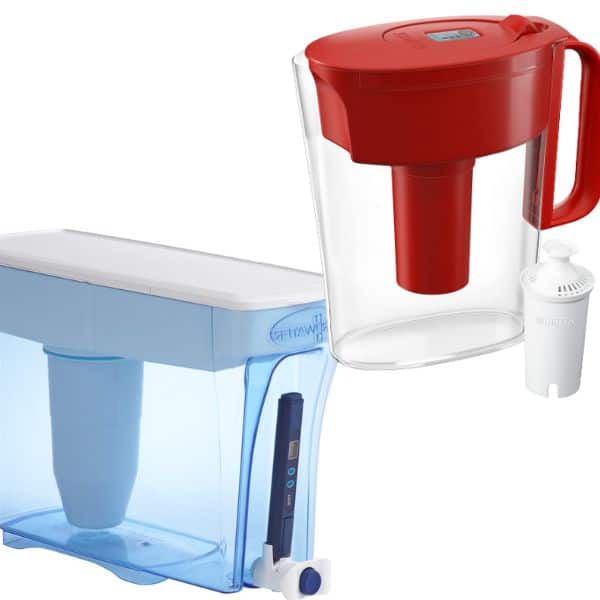
Zero Water Filter Pitcher
The Zero Water filter is more expensive than the Brita Pitcher, but it has several advantages. It uses five-stage filtration with a carbon filter and ion exchange technology to reduce total dissolved solids and other water contaminants. Aside from microplastics, Zerowater filter pitchers can also remove nitrates, cyanide, fluoride as well as PFAS and PFOS, and heavy metals such as barium arsenic, and antimony.
ZeroWater water filter pitchers come with a TDS (Total Dissolved Solids) meter so you could monitor the TDS level of your water. The moment it reads 006 or higher it means your filter is due for replacement. On the other hand, many Brita pitchers have a built-in filter indicator to help you decide when it’s time to change your filter.
The ZeroWater Filter Pitcher is easy to use; simply fill the reservoir with tap water and let the filtration process get to work. The pitcher can hold up to 10 cups of pure filtered water anytime, making it ideal for both individual use or larger households.
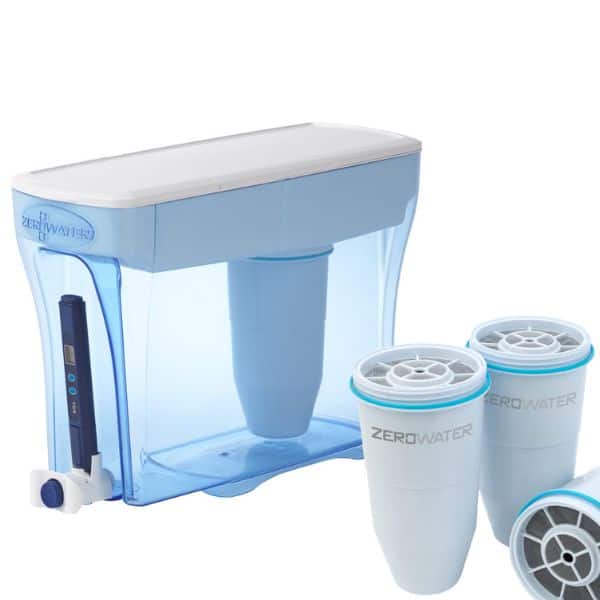
Both pitchers are designed for convenience and require no installation or plumbing; simply fill them up with tap water and let them do their job! They both offer an affordable and convenient way to ensure you have access to clean, pure water. Both options are affordable as compared to bottled water. But which option is the right one for you?
One key is to determine the contaminants present in your water. Doing so will help you choose the right pitcher that will address those issues. Of course, you want to consider other factors such as budget and water usage.
Both pitchers are great options for improving the taste and quality of your drinking water but if you’re looking for maximum purity then Zero Water is likely the best choice.
Can You Use a Zero Water Filter in a Brita Pitcher?
When it comes to selecting the water filter for your home, there are many options available. The Zero Water Filter and the Brita Pitcher are two popular choices, but using a Zero Water filter in a Brita Pitcher is not recommended.
At first glance, the designs of their filters are different from each other. ZeroWater filters are much bigger than Brita filters and each has a distinct locking mechanism. This would mean a Brita filter will not fit into a ZeroWater filter and vice versa.
Brita and ZeroWater filters were designed to function in their respective pitchers and so do not work well when used with other pitchers. Using them together can lead to an improper filtration rate, leaving some contaminants still in the water rather than being completely removed as desired.
Both filters have their advantages but they were designed for different purposes; attempting to use one in the other can lead to decreased performance or even damage due to incompatible parts.
Why Should a Zero Water Filter Not Be Used in a Brita Pitcher?
When it comes to finding a good water filter for personal use, there are a variety of options. However, when considering a ZeroWater Filter in a Brita Pitcher, it’s important to be aware that this is not an ideal combination.
Following are the reasons why you should not use a ZeroWater Filter in a Brita Pitcher:
Filtration method
Due to their differences in filtration methods, you should not use a Zero Water Filter in a Brita Pitcher.
Although they all incorporate carbon block and ion exchange technology in their filters, the number of their filtration stages is not the same.
Zero Water filters utilize a five-stage filtration process to efficiently reduce water contaminants.
The first section removes dust and rust; the second section removes additional suspended solids; the third section is an activated carbon that removes pesticides, mercury, and chlorine; the fourth section is the ion exchange resin that removes metals and the last layer of ultra-fine membrane removes any remaining suspended solids.
Using a two-stage filtration, Brita filters rely on the combination of the granulated carbon filter and ion exchange resin to absorb the chlorine and some heavy metals. First, a non-woven element reduces sediments then the carbon filter traps other contaminants such as metals.
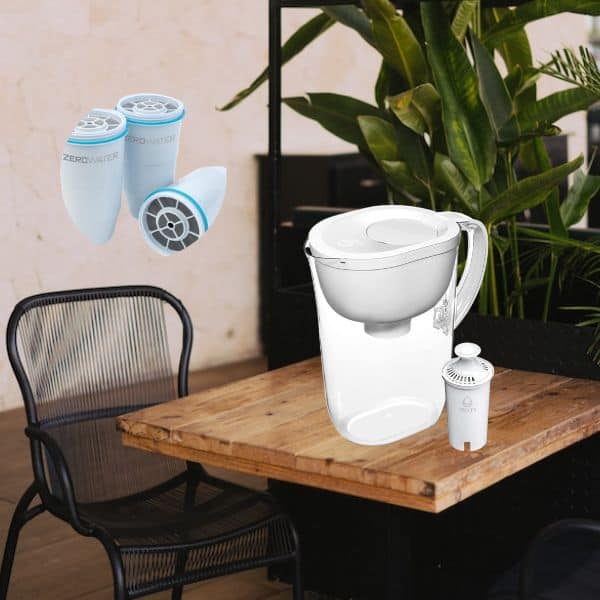
Design and Size
Although Zero Water Filter and Brita Pitcher may look similar and provide consumers with clean drinking water, there are some key differences that make interchanging their filters ill-advised.
The biggest difference is the design and size of the two water filter pitchers. Brita filters are smaller compared to ZeroWater filters. Also, ZeroWater filters are a bit heavy because of the filtering agents inside.
Furthermore, the locking mechanisms of the two filter pitchers are not similar. Brita requires that you should line up the filter’s groove with the notch in the reservoir. ZeroWater filters, in contrast, should be twisted in a clockwise direction until it tightens.
Performance
ZeroWater Filter and Brita Pitcher systems have different functions, making it unwise to use a ZeroWater filter in a Brita pitcher.
The main difference between the two is that ZeroWater filters rely on multi-stage filtration. This is the reason why they can remove a variety of water impurities such as microplastics, nitrates, cyanide, and even fluoride which are hard to remove by other water filter pitchers. Also, ZeroWater filters can remove 99% of total dissolved solids (TDS).
Like ZeroWater filters, Brita pitchers also use carbon block and ion exchange in filtering water contaminants. However, they are not efficient in removing different types of water contaminants. They cannot remove fluoride, microplastics, or nitrates and they cannot reduce the TDS in water.
While both filter pitchers offer some degree of filtration, they do not perform equally when used with other filters.
Brita and Zero Water Replacement Filters Are Not Interchangeable
Brita and ZeroWater replacement filters are two popular water filtration systems for home use. While both companies offer a variety of filter options, replacement filters are not interchangeable between brands.
The filter type determines how much particulate matter is removed from the water, as well as how long it takes to filter one gallon of water. Brita and ZeroWater use different filtration technologies, so their replacement filters will not fit properly in each other’s products.
Additionally, using a non-matching filter can reduce efficiency or cause damage to the system components due to improper size or material compatibility.
To ensure maximum filtering performance, always purchase compatible replacement filters for your specific brand of water filtration system.
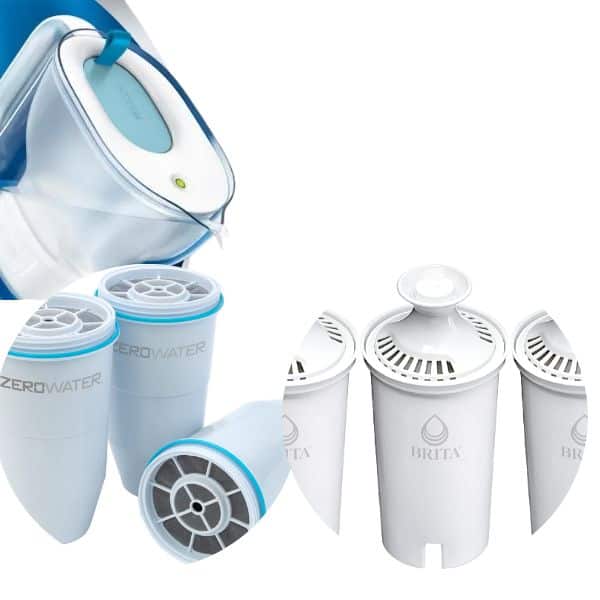
Get the appropriate replacement filter for a Brita Pitcher
When it comes to replacing filters for your Brita pitcher, it is important to make sure you are buying the right one. There are a variety of different filter models available and each one is designed to suit a specific pitcher model.
The first step in choosing the appropriate replacement filter is to figure out which type of pitcher you have. This can be done by looking at the product code on the underside or back of your Brita pitcher. Once you have found this number, simply search it online or refer to the Brita website for information regarding compatible filters.
It is also strongly recommended that you check whether your current filter needs replacing every two months or not, as this will influence how often you need new filters and how much money needs to be spent on them.
Use the right filter designed for the Zero Water Pitcher
When using a ZeroWater pitcher, it is important to use the right filter in order to ensure you are getting the best possible water quality. Regularly changing and replacing your filter will help reduce any contaminants found in your drinking water.
The ZeroWater pitcher comes with its own unique pitcher filter that helps remove dissolved solids and other impurities from tap water. As mentioned above, this special filtration system uses an advanced 5-stage process including a patented ion exchange technology to virtually eliminate all total dissolved solids and provide clean, great-tasting drinking water.
Each ZeroWater Pitcher filter can be used for up to 40 gallons of water before needing replacement. To ensure that your pitcher is performing at maximum efficiency, it is recommended that you change the filter every two months or around 40 gallons of usage for optimal results.
Conclusion
It is important to be aware of what type of water filter to use for your Brita Pitcher. ZeroWater filters are not compatible with Brita pitchers, and using one could lead to damage and even void the warranty. When looking for a filter, make sure it is compatible with your pitcher and check the manufacturer’s instructions before purchasing.
Consumers should always be aware of what type of filter they are using, and when in doubt, consult an expert or refer to the manufacturer’s instructions.
